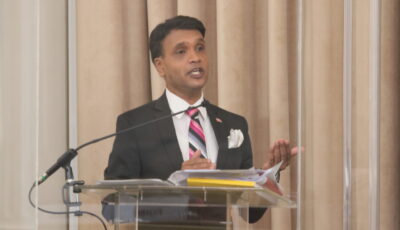For fools rush in where angels fear to tread

Kiel Taklalsingh
Attorney At Law
The National Security Minister’s recent unrestrained language and conduct towards judges and unjustified criticisms of their judicial functions constitute an impermissible trespass into judicial territory.
I remind him, only fools rush in where angels fear to tread.
The minister’s first expedition saw him openly question the exercise of a judge’s discretion to visit a prison facility. Arguably, every judicial officer should undertake such a visit because most of them may be called upon to either imprison persons or award compensation for wrongful imprisonment.
The court’s order to do so was made with the full participation of the Attorney General’s office, which has constitutional responsibility for all State organs. If there was a legitimate concern, then the law prescribes a process of appeal by which the Attorney General could have challenged the order.
The judge, commendably, by way of public statement, fiercely defended his independence and the provenance of his unchallenged order.
Disturbingly, however, the administrative arm of the Judiciary, in an act that would have made Pavlov’s dog blush, published a statement which, in my view, was designed to temper and undermine the judge’s stout defence of his order and discretion. It seems that bells were rung when the minister was chastised, and intellectual salivation came forth to mount an unrealistic defence of the minister’s conduct.
Even the infamous short memory of Trinbagonians had not yet forgotten the minister’s conduct when his second incursion into judicial affairs occurred with his now infamous criminals-have-friends-in-the-Judiciary statement.
On this occasion, the Judiciary issued a statement which reminded me of something my old QRC cricket coach, Mr Rex Duherst, used to tell me: “You don’t pet bad bowling, you punish it.” The minister’s delivery was bad, wayward and ill-directed. It deserved a Phil Simmons crashing square cut; instead, we got what could best be described as a tepid response.
What is required in a functioning democracy is mutual respect between the Executive and the Judiciary. Nolan LJ expressed it best in the famous constitutional case of M v Home Office: “…the courts will respect all acts of the executive within its lawful province, and… the executive will respect all decisions of the courts as to what its lawful province is”.
Public hostility and subversive conduct towards judges must never be tolerated. Our judges exist to guard our fundamental rights. They provide an invaluable public service by settling disputes civilly, thereby preventing the disintegration of civility (where the resolution of dispute becomes a violent contest of crude force).
These actions of the minister served no useful purpose. They were retaliatory in nature, unprofessional, and require an immediate course correction. And that beckons an even more pertinent question: who or how is it to be corrected?
It is unlikely that the Honourable Prime Minister will act; he has not seen it fit to replace the minister, who has been ineffective in curbing crime. The Judiciary can do no more than it has done, and the electorate will have to endure another two years before it has its say.
It seems we are fast becoming a country of ordinary people. I do not mean ordinary in the sense that we have failed to achieve excellence; it is a more dangerous type of “ordinary”, where we are consumed with our insular interests and are afraid to challenge what is wrong or stand up for what is right.
It is the condition that Christopher Browning wrote about in his book, Ordinary Men, which describes the psychosis of collective indifference towards the atrocities in Nazi Germany.
I remain a firm believer in the power of people to effect change. There is much that divides our population, but the defence of our judges is a common cause which should catalyse a robust rebuke of the minister’s actions.
It would be remiss of me not to mention the recent appointment of silk and congratulate all the new appointees. The status of senior counsel can be used for many things; you may increase your fees, you may sit in the front row of court, you will be heard before others. Enjoy the trappings.
May I respectfully remind you that the true purpose of that station is to provide leadership to our profession; a profession that has a wider obligation to society to defend the rule of law, educate the population of its rights, and speak against oppression.
Let us see how you fare.
—Author Kiel Taklalsingh is an attorney-at-law.
Published in the Trinidad Express, Sunday May 14, 2023






